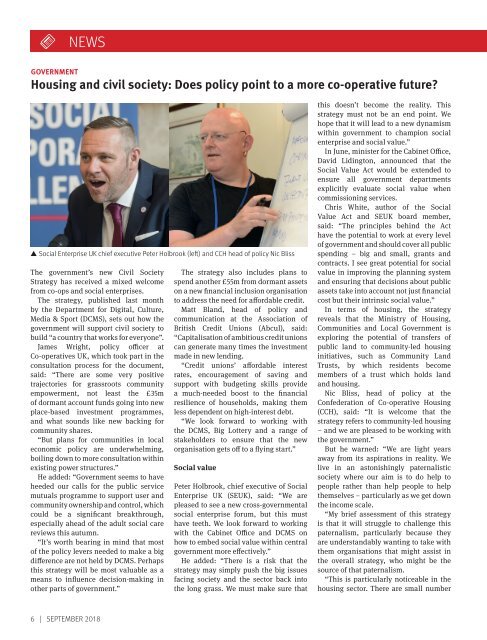SEPTEMBER 2018
The September edition of Co-op News looks at how co-ops cab maintain co-operative values and principles while operating in competitive markets and how this can be a challenge for large co-ops. We examine current research into what influences a co-op’s take on the traditional values of self-help, self-responsibility, democracy, equality, equity and solidarity.
The September edition of Co-op News looks at how co-ops cab maintain co-operative values and principles while operating in competitive markets and how this can be a challenge for large co-ops. We examine current research into what influences a co-op’s take on the traditional values of self-help, self-responsibility, democracy, equality, equity and solidarity.
Create successful ePaper yourself
Turn your PDF publications into a flip-book with our unique Google optimized e-Paper software.
NEWS<br />
GOVERNMENT<br />
Housing and civil society: Does policy point to a more co-operative future?<br />
p Social Enterprise UK chief executive Peter Holbrook (left) and CCH head of policy Nic Bliss<br />
The government’s new Civil Society<br />
Strategy has received a mixed welcome<br />
from co-ops and social enterprises.<br />
The strategy, published last month<br />
by the Department for Digital, Culture,<br />
Media & Sport (DCMS), sets out how the<br />
government will support civil society to<br />
build “a country that works for everyone”.<br />
James Wright, policy officer at<br />
Co-operatives UK, which took part in the<br />
consultation process for the document,<br />
said: “There are some very positive<br />
trajectories for grassroots community<br />
empowerment, not least the £35m<br />
of dormant account funds going into new<br />
place-based investment programmes,<br />
and what sounds like new backing for<br />
community shares.<br />
“But plans for communities in local<br />
economic policy are underwhelming,<br />
boiling down to more consultation within<br />
existing power structures.”<br />
He added: “Government seems to have<br />
heeded our calls for the public service<br />
mutuals programme to support user and<br />
community ownership and control, which<br />
could be a significant breakthrough,<br />
especially ahead of the adult social care<br />
reviews this autumn.<br />
“It’s worth bearing in mind that most<br />
of the policy levers needed to make a big<br />
difference are not held by DCMS. Perhaps<br />
this strategy will be most valuable as a<br />
means to influence decision-making in<br />
other parts of government.”<br />
The strategy also includes plans to<br />
spend another £55m from dormant assets<br />
on a new financial inclusion organisation<br />
to address the need for affordable credit.<br />
Matt Bland, head of policy and<br />
communication at the Association of<br />
British Credit Unions (Abcul), said:<br />
“Capitalisation of ambitious credit unions<br />
can generate many times the investment<br />
made in new lending.<br />
“Credit unions’ affordable interest<br />
rates, encouragement of saving and<br />
support with budgeting skills provide<br />
a much-needed boost to the financial<br />
resilience of households, making them<br />
less dependent on high-interest debt.<br />
“We look forward to working with<br />
the DCMS, Big Lottery and a range of<br />
stakeholders to ensure that the new<br />
organisation gets off to a flying start.”<br />
Social value<br />
Peter Holbrook, chief executive of Social<br />
Enterprise UK (SEUK), said: “We are<br />
pleased to see a new cross-governmental<br />
social enterprise forum, but this must<br />
have teeth. We look forward to working<br />
with the Cabinet Office and DCMS on<br />
how to embed social value within central<br />
government more effectively.”<br />
He added: “There is a risk that the<br />
strategy may simply push the big issues<br />
facing society and the sector back into<br />
the long grass. We must make sure that<br />
this doesn’t become the reality. This<br />
strategy must not be an end point. We<br />
hope that it will lead to a new dynamism<br />
within government to champion social<br />
enterprise and social value.”<br />
In June, minister for the Cabinet Office,<br />
David Lidington, announced that the<br />
Social Value Act would be extended to<br />
ensure all government departments<br />
explicitly evaluate social value when<br />
commissioning services.<br />
Chris White, author of the Social<br />
Value Act and SEUK board member,<br />
said: “The principles behind the Act<br />
have the potential to work at every level<br />
of government and should cover all public<br />
spending – big and small, grants and<br />
contracts. I see great potential for social<br />
value in improving the planning system<br />
and ensuring that decisions about public<br />
assets take into account not just financial<br />
cost but their intrinsic social value.”<br />
In terms of housing, the strategy<br />
reveals that the Ministry of Housing,<br />
Communities and Local Government is<br />
exploring the potential of transfers of<br />
public land to community-led housing<br />
initiatives, such as Community Land<br />
Trusts, by which residents become<br />
members of a trust which holds land<br />
and housing.<br />
Nic Bliss, head of policy at the<br />
Confederation of Co-operative Housing<br />
(CCH), said: “It is welcome that the<br />
strategy refers to community-led housing<br />
– and we are pleased to be working with<br />
the government.”<br />
But he warned: “We are light years<br />
away from its aspirations in reality. We<br />
live in an astonishingly paternalistic<br />
society where our aim is to do help to<br />
people rather than help people to help<br />
themselves – particularly as we get down<br />
the income scale.<br />
“My brief assessment of this strategy<br />
is that it will struggle to challenge this<br />
paternalism, particularly because they<br />
are understandably wanting to take with<br />
them organisations that might assist in<br />
the overall strategy, who might be the<br />
source of that paternalism.<br />
“This is particularly noticeable in the<br />
housing sector. There are small number<br />
6 | <strong>SEPTEMBER</strong> <strong>2018</strong>


















